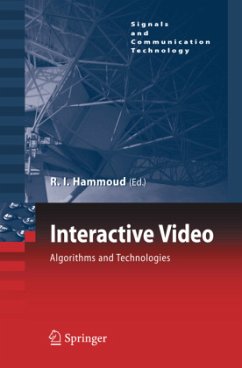My purpose in writing Interactive Video: Algorithms and Technologies is to respond to an increased demand for a complete scienti?c guide that covers concepts, bene?ts, algorithms and interfaces of the emerging interactive digital video technology. This technology promises an end of the days of dull videos, linear playback, manual video search, and non-consent video-content. Many futurists and I share the view that interactive video is becoming the future standard of the most attractive video formats which will o?er users n- conventional interactive features, powerful knowledge-acquisition and teaching tools, e?cient storage, as well as non-linear ways of navigation and searching. In recent years, video content has skyrocketed as a result of decreasing cost of video acquisition and storage devices, increasing network bandwidth capacities, and improving compression techniques. The rapid expansion of Internet connectivity and increasing interest in video-on-demand, e-learning and other online multimedia rich applications, makes video as accessible as any static data type like text and graphic. The "open video" market that enables consumers to buy and rent digital videos over Internet, is taking another important boost as video distribution is becoming available for people on "the move". Now they can select, download and view various video types on their consumer electronics devices like mobileTV and video-playing iPods.
Bitte wählen Sie Ihr Anliegen aus.
Rechnungen
Retourenschein anfordern
Bestellstatus
Storno








